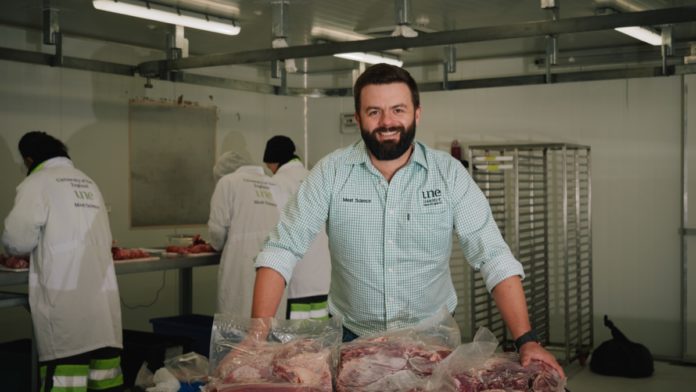Eaten Australian goat recently? Probably not – 90% of Australian goat meat production is exported.
A meat scientist at the University of New England (UNE), Jarrod Lees (pictured) would like to change that.
Dr Lees is the winner of the Meat & Livestock Australia Award in the 2021 Science and Innovation Awards for Young People in Agriculture, Fisheries and Forestry.
He will use his $22,000 award to investigate whether something that is currently treated as single product, ‘goat meat’, can be differentiated in the market as effectively as beef and lamb.
“Goat meat is healthy, delicious and relatively abundant,” Dr Lees says.
“There is scope to grow a domestic market for a premium goat product, but first we need to establish whether untrained consumers can identify correctly cooked premium cuts, versus the undistinguished chunks of meat that goat is often cooked as.”
He will test various cuts of goat, using different cooking methods, employing the Meat Standards Australia (MSA) consumer taste-testing methods that Australia has perfected over decades to elevate the eating experience of beef and lamb.
“MLA found that ‘cultural familiarity’ is a major barrier to the domestic consumption of goatmeat,” Dr Lees says.
“I plan to cook goat meat in ways that are familiar to most Australians – grilling, roasting and slow cooking – and then measure what everyday consumers think of the eating experience. The cuts we use will also be more familiar, like leg roast or loin steak.”
“This will give us an idea of how consumers respond to goatmeat presented in a similar fashion to lamb, which is culturally very familiar. It will be a base measurement of eating quality that can only be improved with herbs and spices!”
Dr Lees’s taste-testing will be conducted using Boer goats from a goat breeder and branded meat company. Most of Australia’s goat meat production comes from wild feral goats, Dr Lees acknowledges, but if there is potential for premium prices for a premium product, goat producers can justify the investment in a breeding program to lift meat quality.
Considerable work will remain to be done to get that product on the shelves, but there will at least be a foundation on which to build.
For ultimate success, the goat sector will need to do as the beef and lamb industries have done over decades, and establish principles to ensure a consistently reliable eating experience for consumers. Depending on demand for premium goat meat, that might also drive greater participation in KidPlan, the platform for genetic prediction of goat breeding performance.
First though, Dr Lees has to establish that goat meat isn’t just goat meat. His own experience as an eater gives him confidence that it isn’t the case, and that there is some truly outstanding goat-based culinary experiences to be had – but that’s now a question for 180 random consumers to determine.


